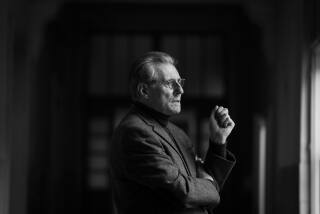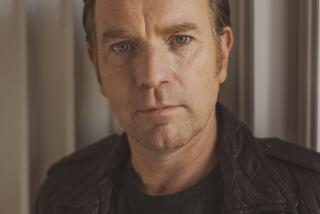Commentary: 50 years after ‘The Graduate,’ restless Benjamin Braddock still speaks to young men — and women

Kenneth Turan and Justin Chang discuss Mike Nichols’ landmark 1967 film, “The Graduate,” starring Dustin Hoffman and Anne Bancroft.
“The Graduate” charmed most everyone when it arrived in theaters 50 years ago, topping the 1967 box office, winning Mike Nichols an Academy Award for best director, turning a little-known stage actor named Dustin Hoffman into a movie star and becoming an evergreen generational touchstone. But it didn’t charm Pauline Kael, who, in her famous 1969 essay “Trash, Art and the Movies,” wrote that the film “only wants to succeed and that’s fundamentally what’s the matter with it.”
Kael damned the movie’s crowd-pleasing slickness as proof of its inauthenticity, its highly salable vision of youthful innocence. And she ribbed the audiences who bought that vision, mainly because so many of them were willing to see themselves in the character of Benjamin Braddock — a young man who “has nothing to communicate,” Kael wrote, “which is just what makes him an acceptable movie hero for the large movie audience.”
MORE: 50 years later, ‘The Graduate’ is a study in the power of obsession
Whether or not Benjamin has anything to communicate, many men did of course embrace him, starting with the novelist Charles Webb, who based his original 1963 book, “The Graduate,” on his own personal experience (minus the whole Mrs. Robinson thing). Producer Lawrence Turman, who optioned the rights to the material, claimed a similar level of identification, as did Nichols and the movie’s co-screenwriter Buck Henry. “Turman, Nichols and I related to ‘The Graduate’ in exactly the same way,” Henry would later tell Vanity Fair’s Sam Kashner. “We all thought we were Benjamin Braddock.”
Benjamin’s restlessness lives on in the awkward, indecisive heroines of ‘Frances Ha’ and ‘Funny Ha Ha,’ to say nothing of the collected works of Lena Dunham.
On the occasion of its golden anniversary, “The Graduate” is returning to theaters in a newly restored 4K digital presentation, allowing a fresh generation of young viewers the opportunity to embrace Benjamin anew. And for all that has changed in five decades — plastics may no longer be the future, and the idea of going to bed with a woman twice your age may seem less daring than passé — I suspect that more than a few of them might. Benjamin may be a nervous, spirited icon of late-’60s revolt, but he is also, in some respects, a classic proto-millennial hero.
His rootlessness and uncertainty about who he is and what he wants in life — and just as importantly, his willingness to own and assert that uncertainty — seem to anticipate each new generation’s crises of identity, career and purpose. An imaginative cine-sociologist might sketch a plausible throughline from Benjamin to the unorthodox postgraduate heroes of movies like “Into the Wild” and “Adventureland,” perhaps winding his way past the Generation Xers of “Reality Bites” and “Kicking and Screaming” en route. Should Richard Linklater and Ellar Coltrane ever get around to making that sequel to “Boyhood,” it’s no stretch to think that he and Benjamin might share some spiritual if not genetic DNA.
Which is not to suggest that the Braddocks of the millennial era are exclusively young men. On the contrary, in an era where young women enjoy far greater social, sexual and vocational freedom, some of Benjamin’s restlessness lives on in the awkward, indecisive heroines of “Frances Ha” and “Funny Ha Ha,” to say nothing of the collected works of Lena Dunham, including “Tiny Furniture” and HBO’s just-concluded series “Girls.”
It is Bancroft who lingers nonetheless, Bancroft who can break your heart simply by emoting through the crack of a door left ajar.
Most of these movies and TV shows observe their characters’ fumbling first steps into the adult world with a crucial measure of distance, from a perspective of greater wisdom and life experience. That distance is what makes these stories funny (comedy being tragedy plus time) and also helps arm them against the pitfalls of narcissism. It’s what allows storytellers to poke fun at their characters’ foibles and embrace them at the same time.
The charm of “The Graduate” — and in some ways, the limitation — is that the movie always seems to know what it’s doing, even when Benjamin Braddock doesn’t have a clue. It’s here, I think, that what Kael identifies as the movie’s success drive comes into play: It’s a supremely confident portrait of a young man utterly lacking in confidence, a study in alienation that itself could scarcely feel less alienating. The iconic final scene, of Benjamin and his runaway bride on a city bus, remains a memorable moment of exhilaration giving way to panic — and even the uncertainty, the not knowing, feels calculated to within an inch of its life.

Simon & Garfunkel soundtrack the famous final scene from 1967’s “The Graduate,” starring Dustin Hoffman and Katharine Ross.
The movie’s accidental good fortune, so improbable at the time, has long since hardened with hindsight into a sure thing, the stuff of Hollywood history. Creative innovations that might have once seemed brilliant and daring — such as the film’s modest visual and sonic experimentation, lightly influenced by the French New Wave — now feel almost commonplace. Certainly the technique of using Simon & Garfunkel (or whatever today’s pop/rock/emo equivalent might be) as a direct pipeline into a character’s mood has long since lost its novelty.
Benjamin may be a nervous, spirited icon of late-’60s revolt, but he is also, in some respects, a classic proto-millennial hero.
Hoffman’s performance, once deemed a triumph of counter-intuitive casting, is in danger of being under-appreciated at a time when — thanks to Woody Allen and Judd Apatow, among others — the romantic misadventures of unconventionally handsome Jewish men are no longer a rarity. For that matter, Benjamin’s summer fling with Mrs. Robinson, handled with taste, discretion and a carefully deployed light switch, doesn’t quite live up to its past reputation for shock or sexual candor.
This may actually be a good thing. Anne Bancroft’s Oscar-nominated performance as Mrs. Robinson overshadowed much of her later film work, to the actress’ annoyance, but it remains the single finest thing in “The Graduate.” That makes it all the more regrettable that the film abandons the character in its second half: While Benjamin seeks love and redemption, Mrs. Robinson is shoved to the margins, becoming little more than a shrill, face-slapping villainess and a sexual-fantasy punchline for the ages.
But it is Bancroft who lingers nonetheless, Bancroft who can break your heart simply by emoting through the crack of a door left ajar. Without ever dominating the picture’s perspective, she makes us feel the boredom and loneliness of a woman who once had aspirations and desires of her own, but who found herself swallowed up by the materialist culture that Benjamin now rebels against. The movie may be his — the title says as much — but its deepest, most resonant tragedy belongs to her.
From the archives: Mike Nichols and the versatility paradox
From the archives: Mike Nichols’ talks about his ‘wonderful life’
From the archives: Mike Nichols’ incisive, touching films got personal
More to Read
Only good movies
Get the Indie Focus newsletter, Mark Olsen's weekly guide to the world of cinema.
You may occasionally receive promotional content from the Los Angeles Times.











